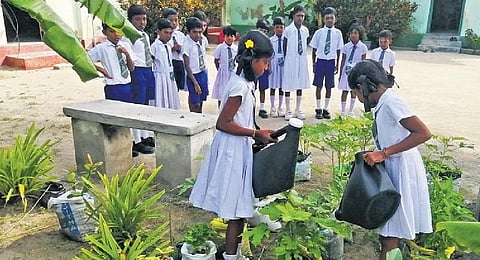

CHENNAI: When Poongkothai Chandrahasan, founder/president of Serendip Be The Change Foundation learned of children being rendered malnourished in the aftermath of the ongoing economic crisis in Sri Lanka, she picked up the phone and contacted her school friend, nutritionist Divya Sathyaraj.
“I called her to brainstorm on setting up a sustainable way of looking at the whole food crisis. I was thinking of a fundraiser and that’s when she told me she would make the first payment towards the cause that resonates with her,” says Poongkothai. Right after, the Green School, Green Revolution project was born in October 2022.
“It was appa’s (actor Sathyaraj’s) birthday in two weeks and every year I support a cause. This time, I decided to write a cheque for the Green School project. I had told Poongkothai that whatever support she required, I was here to help her,” says Divya, founder of the Mahilmadhi Movement that started during the pandemic to provide nutritious food free of cost to people in the lower income group.
A sustainable revolution
In the Green School, Green Revolution initiative, organic gardens are set up in schools and weekly organic cultivation training is imparted to students. The yields from the garden will be used in the school kitchen which is set up/renovated by the team to provide meals for schoolchildren. The students can sell the surplus vegetables and use that money to sustain their gardens, thereby reducing their dependence on further funding.
In the case of preschools, organic home and preschool gardens are set up, along with organic cultivation training given to the mothers of the preschool children, so that they can pool their vegetable produce and cook nutritious food for the children in the newly set up preschool kitchens. They are working in partnership with the Northern Province Agriculture Ministry, and the organic cultivation and gardening training is given by the Government Agricultural Instructor. Poongkothai was already working on a similar sustainable project in Tamil Nadu since 2017, which was a huge success.
Divya’s contribution covered the needs of the entire Baby Jesus preschool in Neduntheevu, a tiny island that can be reached only by using a ferry from Jaffna. Poongkothai noted that the malnourishment level in this fishing hamlet was high. With this contribution, mothers of children studying in the pre-school were given agricultural training and all the gardening equipment and seeds. The preschool pantry was also renovated into a proper kitchen and all kitchen utensils were provided. Now the seeds have grown into plants and these organic vegetables grown in the gardens are being cooked in the school kitchen and served to the children with their lunch.
After the first contribution, the Serndip social enterprise that works towards empowering Sri Lankan Tamil women by helping them make handcrafted products raised funds for five other schools. “Two more preschools and three other schools. As and when we raise funds, we will be taking on schools in the Jaffna peninsula. We hope that we get more people on board our movement. So far, around 1,000 students have benefitted,” shares Poongkothai.
Creating awareness
Divya has not had a chance to visit Sri Lanka — which she hopes to do so soon — and assess these children herself. Based on the photos shared by Poongkothai she deduces that while the children are severely malnourished, there is a deficiency of calcium, iron and vitamin C. “Basically the problem is malnourishment because they are unable to eat enough. The price of vegetables has been high for the past two years. Our children in the preschool, for example, have been eating just rice, or if possible add some coconut milk and make paal soru. They cannot afford to have vegetables,” points out Poongkothai. Divya believes that a child not only needs food but nutritious food. “If there is a deficiency of calcium, iron or vitamin C when young, it is difficult to compensate for that later. If there is low calcium, bone development is affected. If vitamin C levels are low, then immunity is affected,” she says.
To expand this project to other cities, Poongkothai and Divya are planning on conducting fundraisers. The plan is to promote eco-friendly handcrafted products from the country and also conduct a Sri Lanka food festival, for which they have some partners on board. “We want to bring the green products made in Sri Lanka and host an exhibition, which we are planning to call #Green. We will be empowering the community and marketing their products, encouraging other green products and healthy food,” says Poongkothai. Divya adds, “We want to take this project to other schools in Sri Lanka and Tamil Nadu. I think this is a very efficient programme to combat malnutrition.”